Sightseeing Rome: The top 10 sights in Rome with entry, location & opening hours. All famous sights in Rome at a glance: Here you find an overview of the most popular sights in Rome. It is meant to help you put together your own personal list. Your holiday preparations will become a whole lot easier with this guide. It includes the 10 most famous attractions in Rome and information about their location, opening hours and entry fees.
Sightseeing Rome: The top 10 sights in Rome with entry, location & opening hours
The list starts with the monuments that probably everyone has already heard about.
1. The Colosseum in Rome
The Colosseum is one of the landmarks in the Italian capital. When one thinks about Rome, they will picture antique ruins and of course the famous amphitheater.
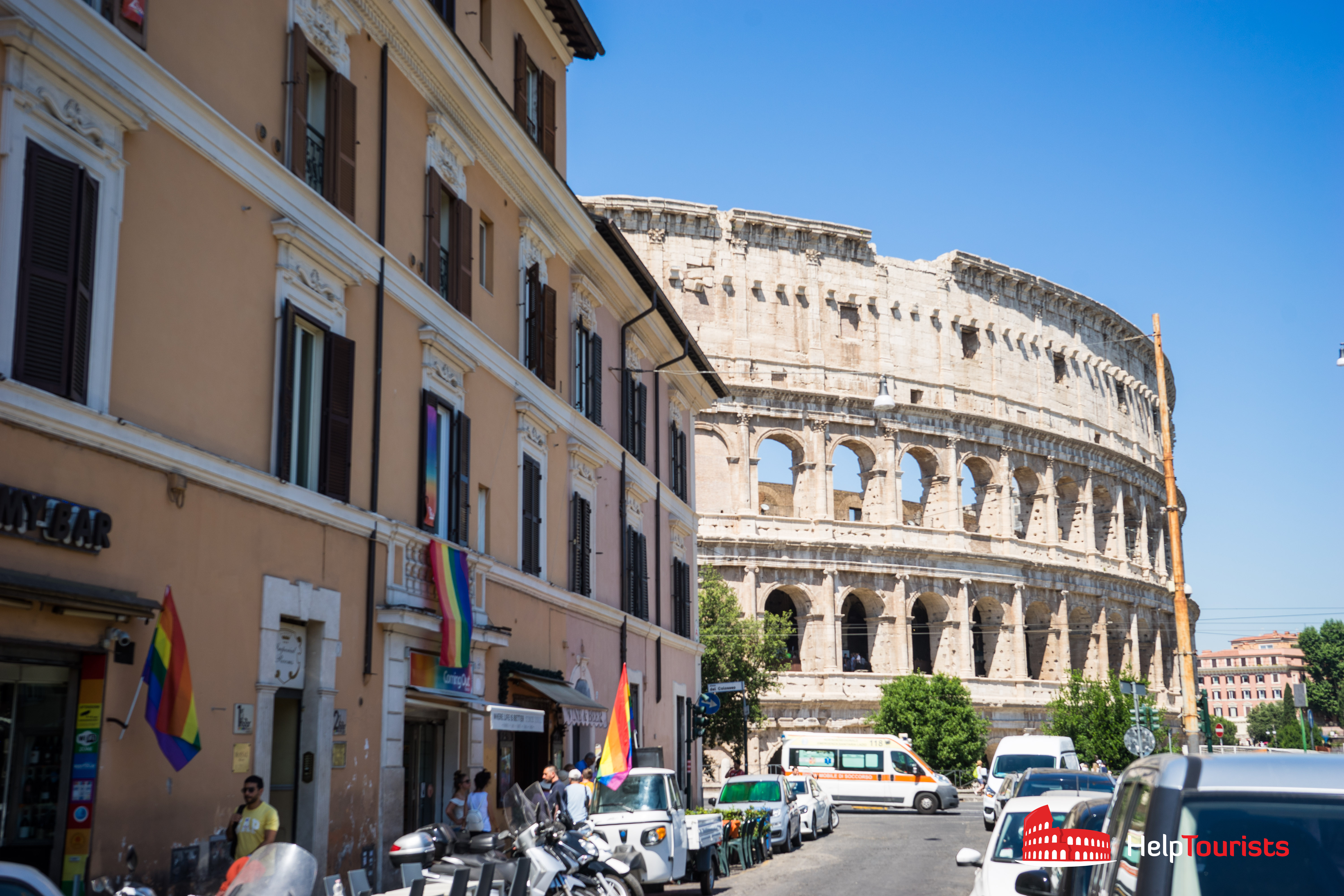
With more than 6 million visitors the Colosseum in Rome is among the most visited sights in the world. It was built between 70 and 80 AD and served its original purpose until the Middle Ages.
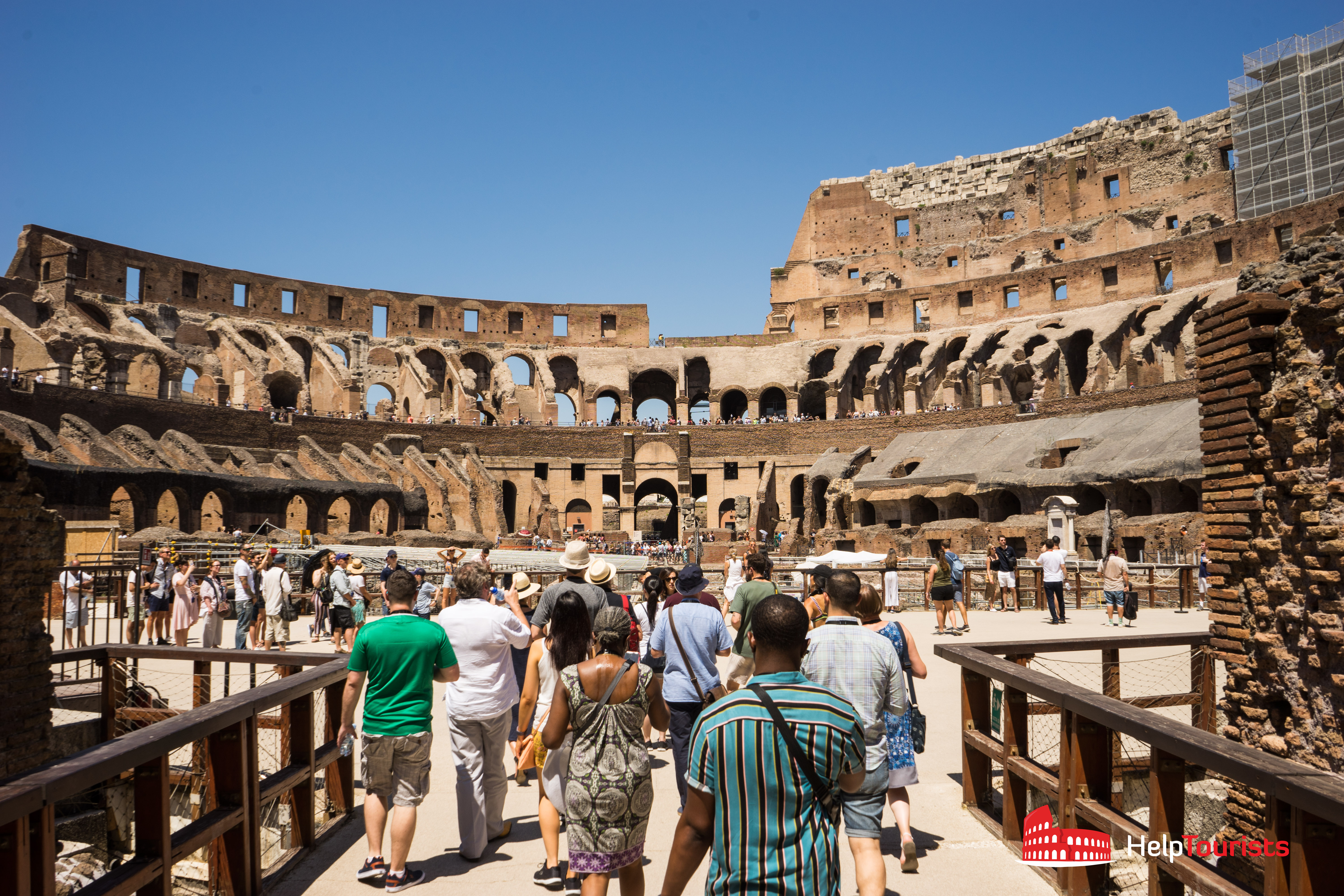
For a long period of time, it then became a stone quarry for the Roman people and pieces of the monument have collapsed overtime. This explains why entire walls of the Colosseum are missing.
How to get to the Colosseum in Rome
Take the metro line B or the tramway line 3 to the station “Colosseo”.
Entry fees to the Colosseum in Rome
The entry fee to the Colosseum is 12 euro for adults and 7,50 euro for adolescents between 18 and 26. Children under 18 can visit the Colosseum for free. The entry ticket also includes entry to the Forum Romanum and the Palatine Hill.
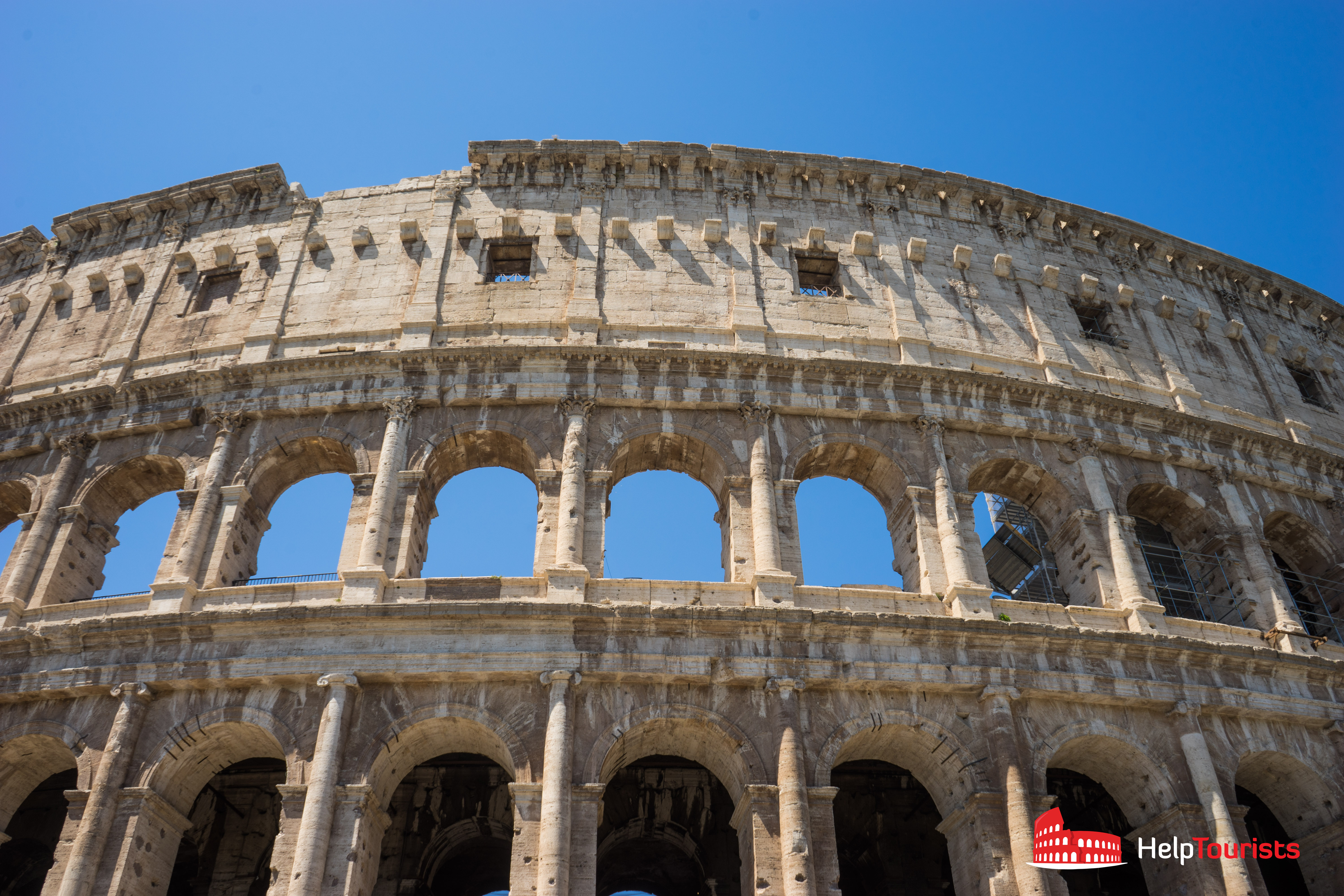
Opening hours of the Colosseum in Rome
The Colosseum in Rome is open most of the year:
- Last Sunday in October to February 15: 8:30 am to 4:30 pm
- February 16 to March 15: 8:30 am to 5 pm
- March 16 until the last Saturday in March: 8:30 am to 5:30 pm
- Last Sunday in March to August 31st: 8:30 am to 7:15 pm
- September 1-30: 8:30 am to 7 pm
- October 1st until the last Saturday in October: 8:30 am to 6:30 pm
The last entry is always one hour before the closing time. The Colosseum is closed on December 25 and January 1st.
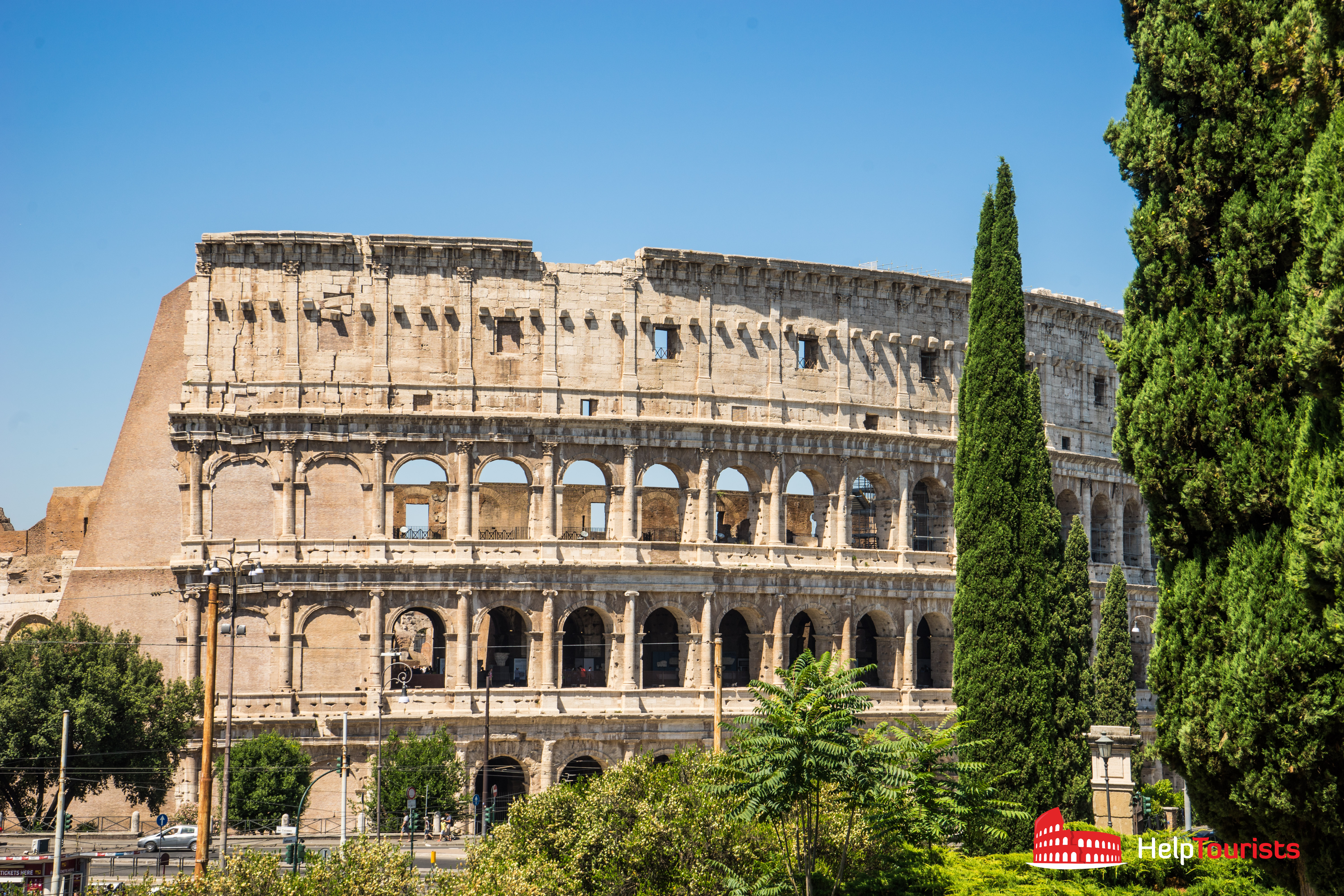
2. Top 10 sights in Rome: Pantheon
The Pantheon also belongs to the most famous sightseeings in Rome. Construction began in 114 AD and the Pantheon is regarded as the best preserved monument of ancient Rome. The most impressive part is the large-sized vault which seems to hover effortlessly over the visitors’ heads.
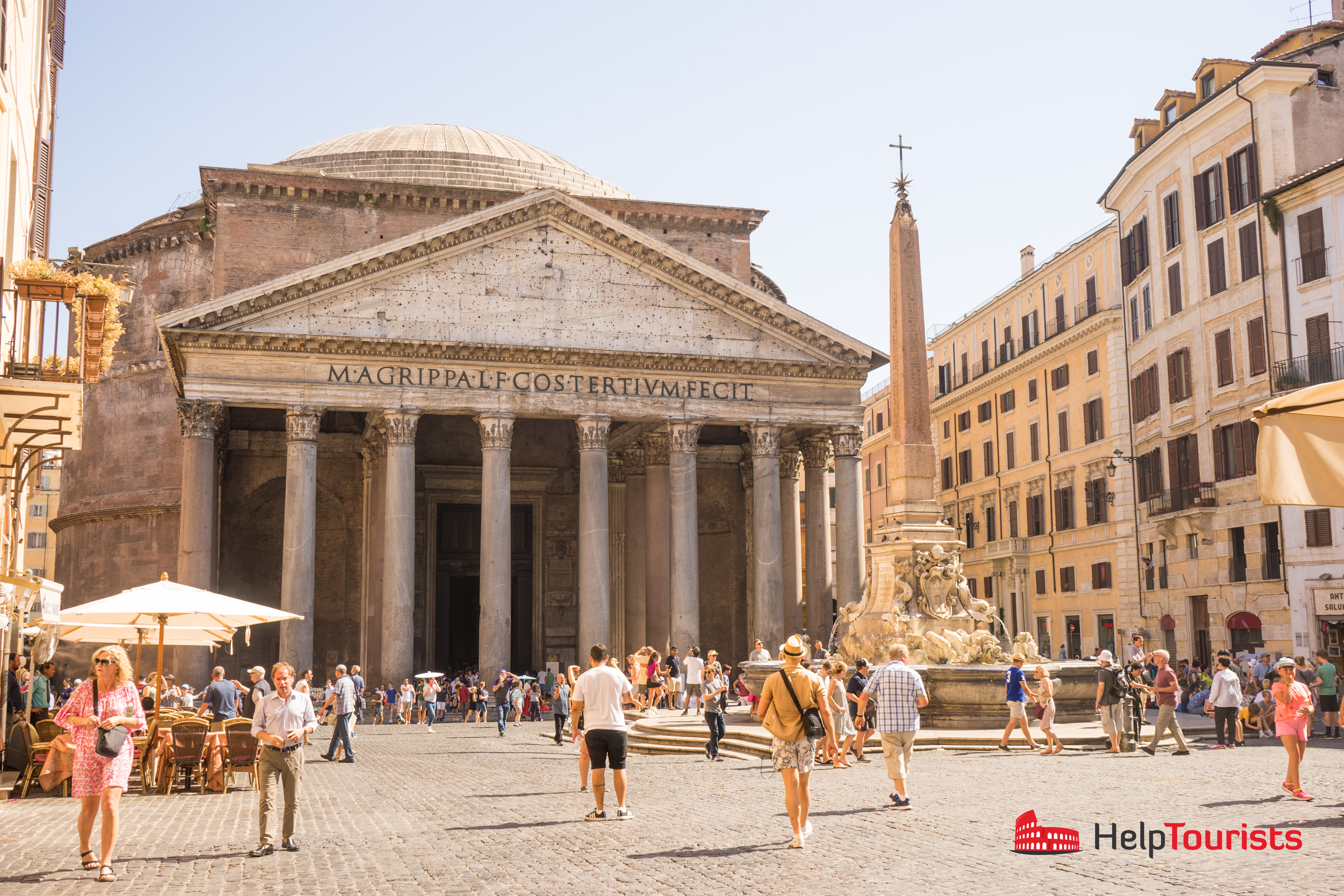
In 1700 it was the biggest vault with a diameter of 43,4 m. The ancient Romans put all of their art in architecture into the creation of the Pantheon. It still makes a solid impression today. From the outside you will mostly notice the grey stone which reveals the age of the Pantheon. But this is easily forgotten once you enter the Pantheon.
How to get to the Pantheon in Rome
Pantheon in Rome is not close to any metro station. However, you can take the tramway line 3 to the station “Piazza Venezia”.
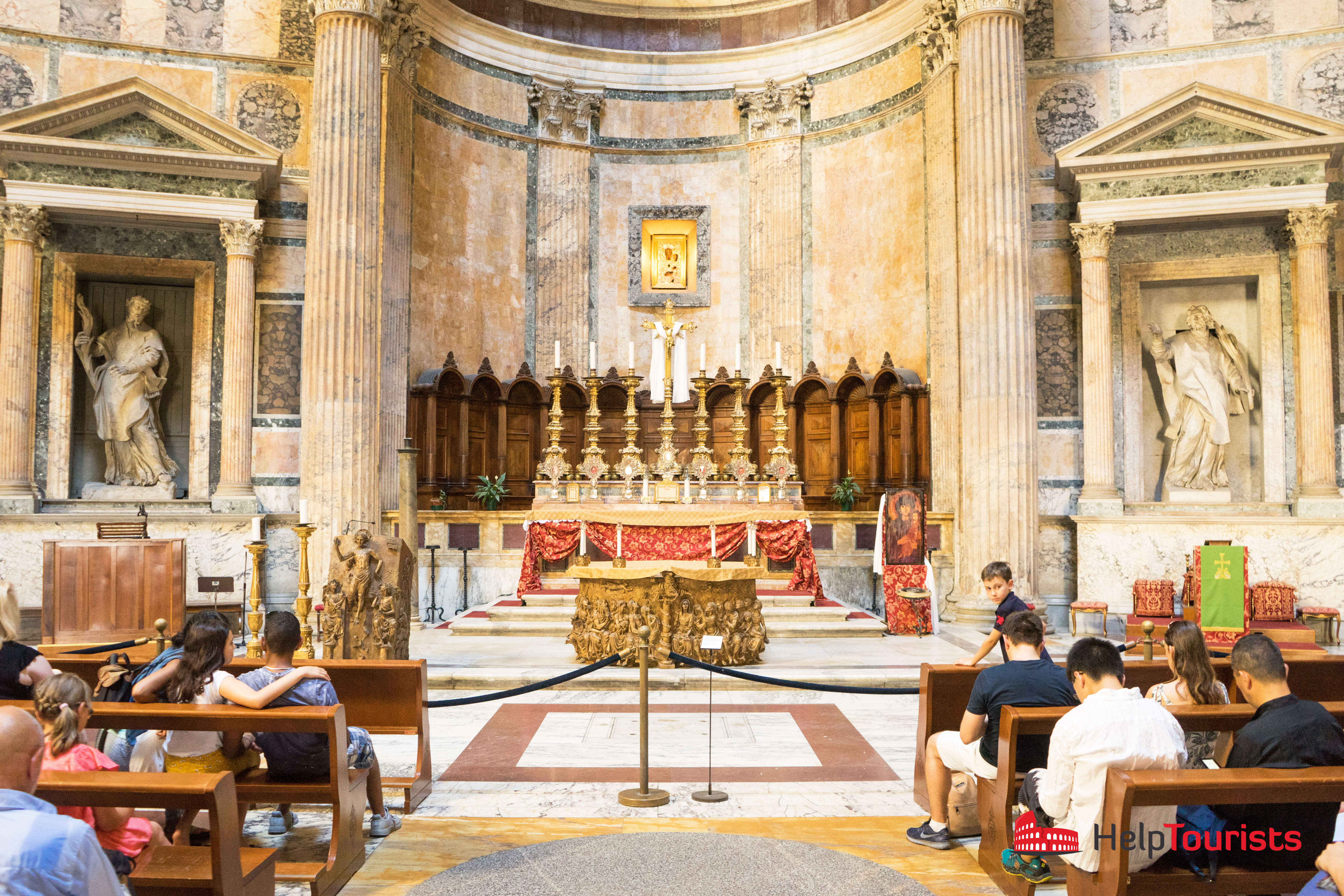
Entry fee to the Pantheon in Rome
The entry fee to the Pantheon is free like in all churches in Rome.
Opening hours of the Pantheon in Rome
The Pantheon in Rome is open Monday through Saturday from 8:30 am to 7:30 pm. On Sundays it is open from 9 am to 6 pm, and on holidays from 9 am to 1 pm.
3. The Roman Forum in Rome
The Forum Romanum in Rome was for a long time the centerpiece in Roman life and paved the road to success of the Roman Empire over Europe.
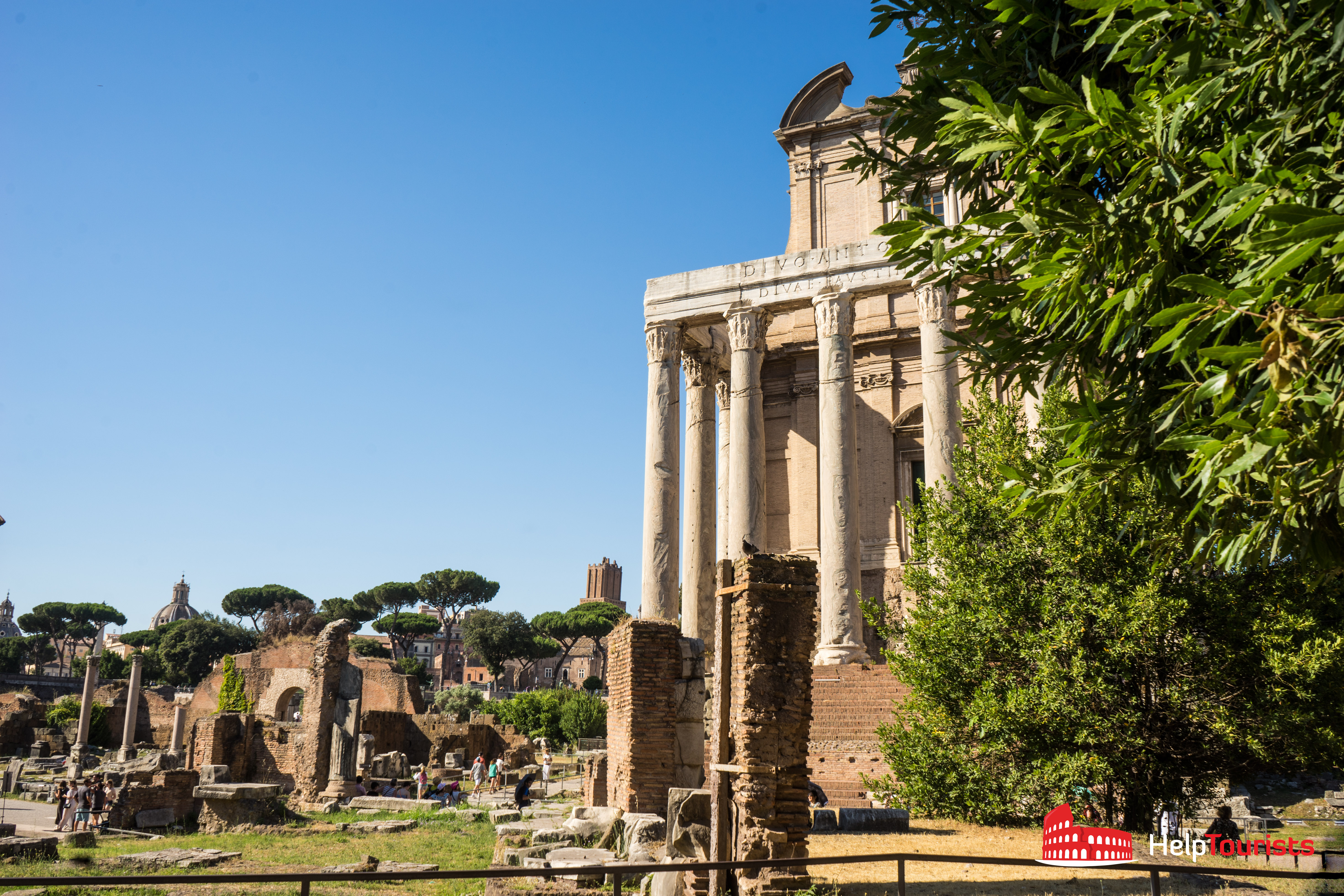
Politics was an important daily matter and exercised in its palaces, temples and streets. But this was only one aspect. The Forum Romanum was also a cultural, economic and social hub in Rome. Important temples are still present here today.
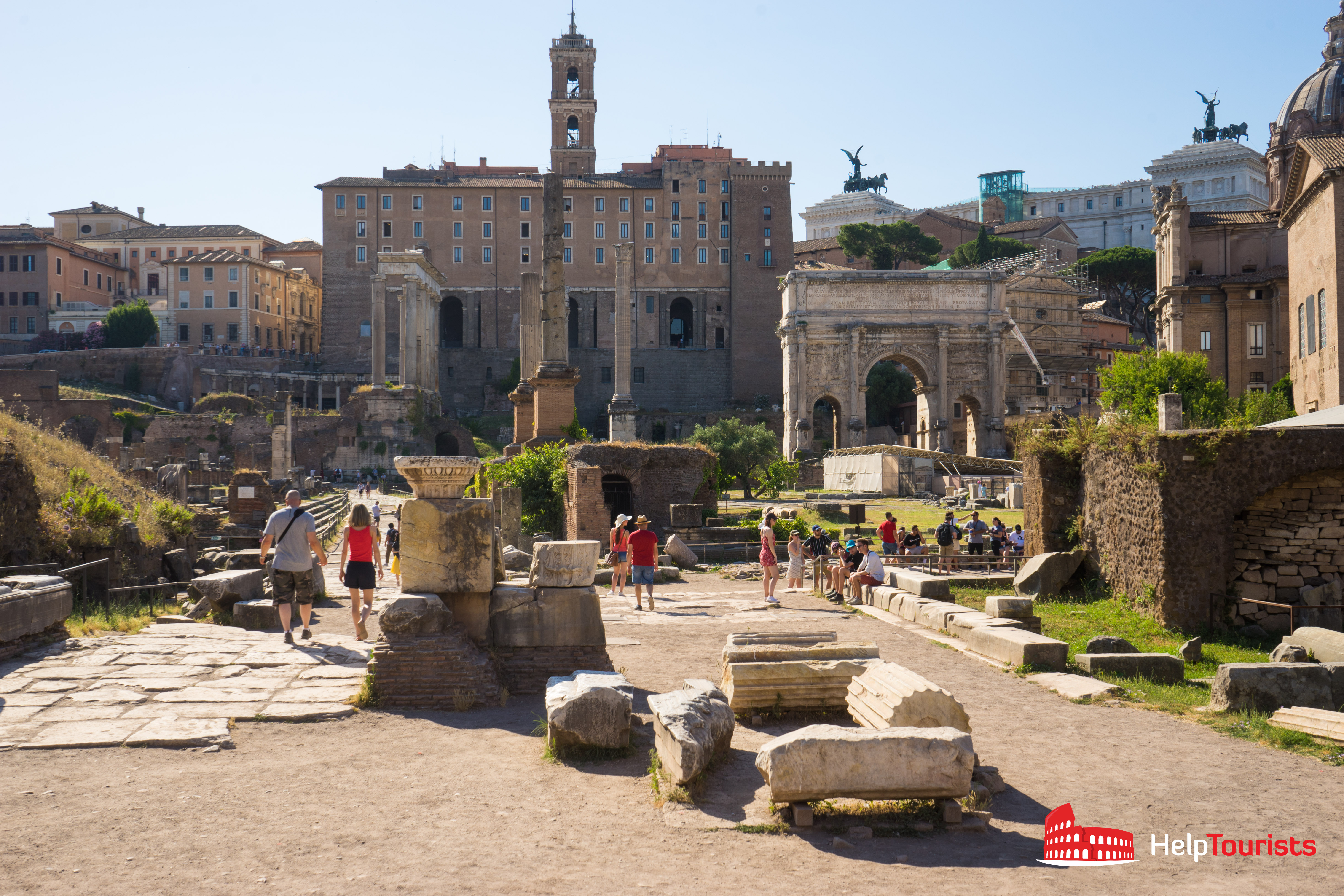
The Forum Romanum itself is situated in a valley among three hills where Rome was built.
How to get to the Roman Forum in Rome
The Forum Romanum in Rome is accessible by metro line B or the tramway line 3 at the station “Colosseo”.
Entry fees to the Roman Forum in Rome
The entry fee to the Forum Romanum in Rome is 12 euro for adults and 7,50 euro for adolescents between 18 and 26. Children under 18 can visit the Forum Romanum for free. Important: the entry ticket to the Forum Romanum also includes entry to the Colosseum and the Palatine Hill.
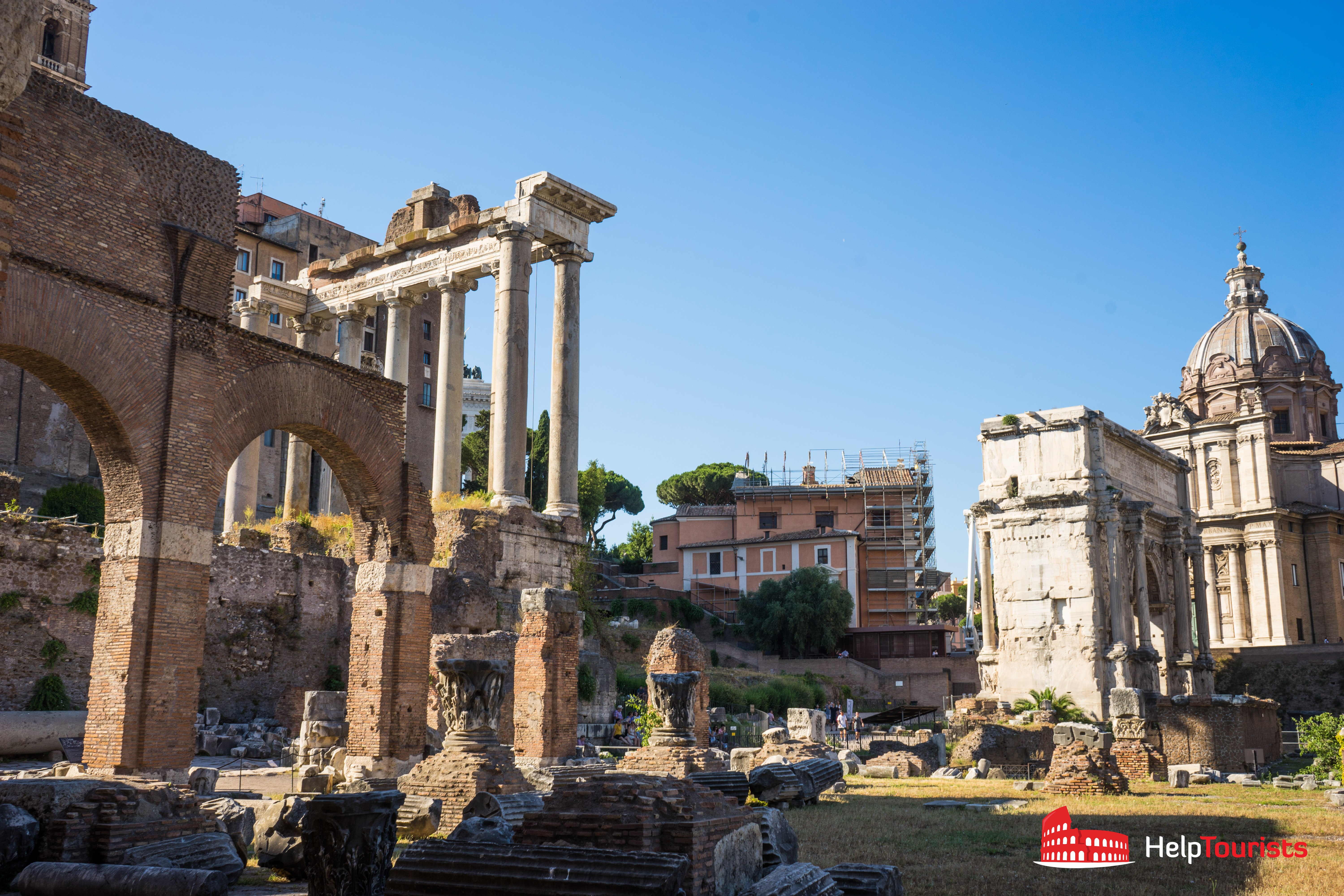
Opening hours of the Roman Forum in Rome
The Roman Forum is open most of the year:
- Last Sunday in October to February 15: 8:30 am to 4:30 pm
- February 16 to March 15: 8:30 am to 5 pm
- March 16 until the last Saturday in March: 8:30 am to 5:30 pm
- Last Sunday in March to August 31st: 8:30 am to 7:15 pm
- September 1-30: 8:30 am to 7 pm
- October 1st until the last Saturday in October: 8:30 am to 6:30 pm
The last entry is always one hour before the closing time. The Colosseum is closed on December 25 and January 1st.
4. Top 10 sights in Rome: The Spanish Steps
Hardly any other language in the world calls these stairs the Spanish Steps. The name is derived from the space just at the bottom.
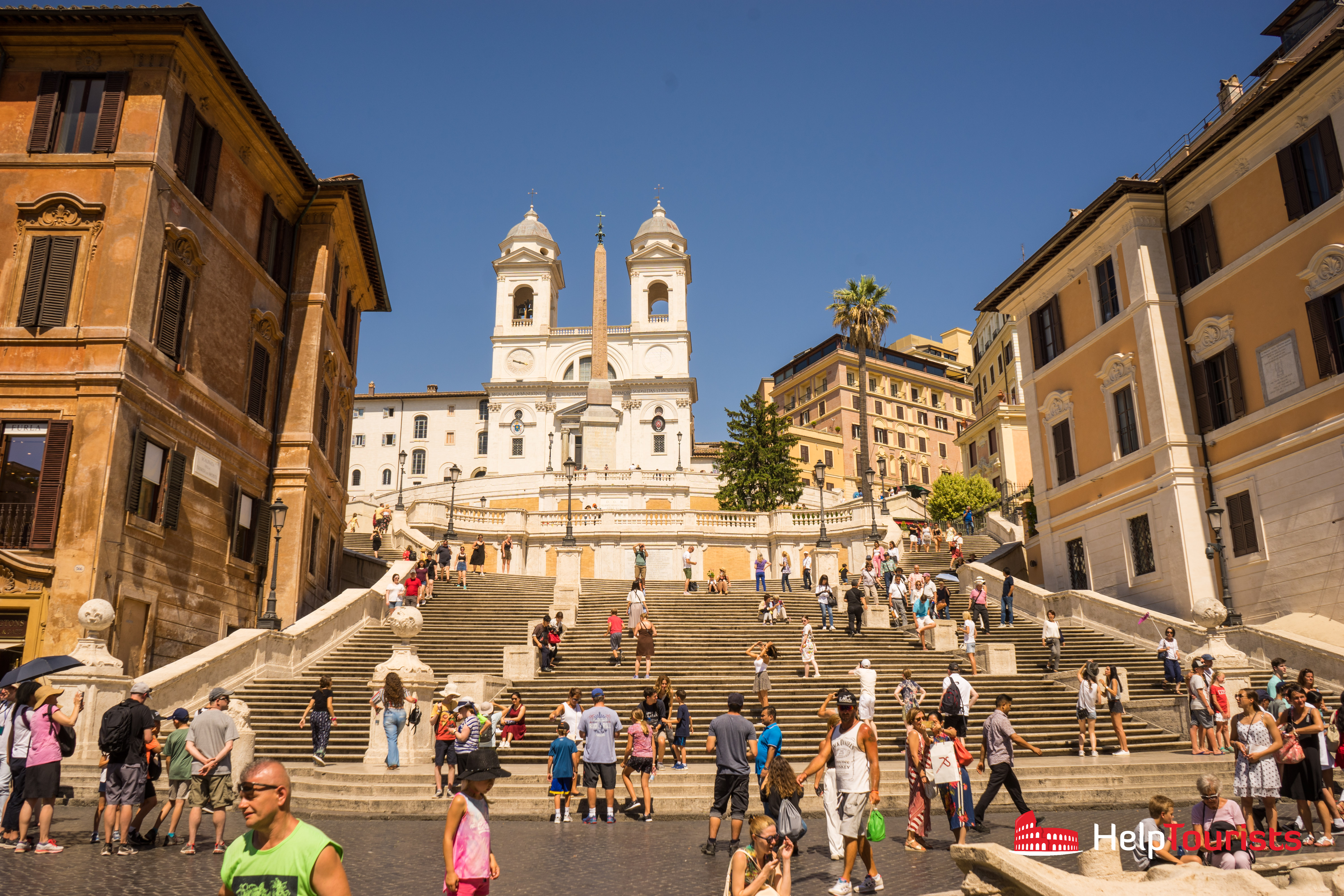
The stairs are leading to a church that was funded by Louis XII. For a long time the French king and the Pope were in dispute over the stairs that was ought to connect Rome to the church. Ultimately, the Pope won and established the stairs in an Italian style. The Spanish Stairs are one of the most popular places for tourists in Rome and also appreciated by the Roman people. It is always busy here.
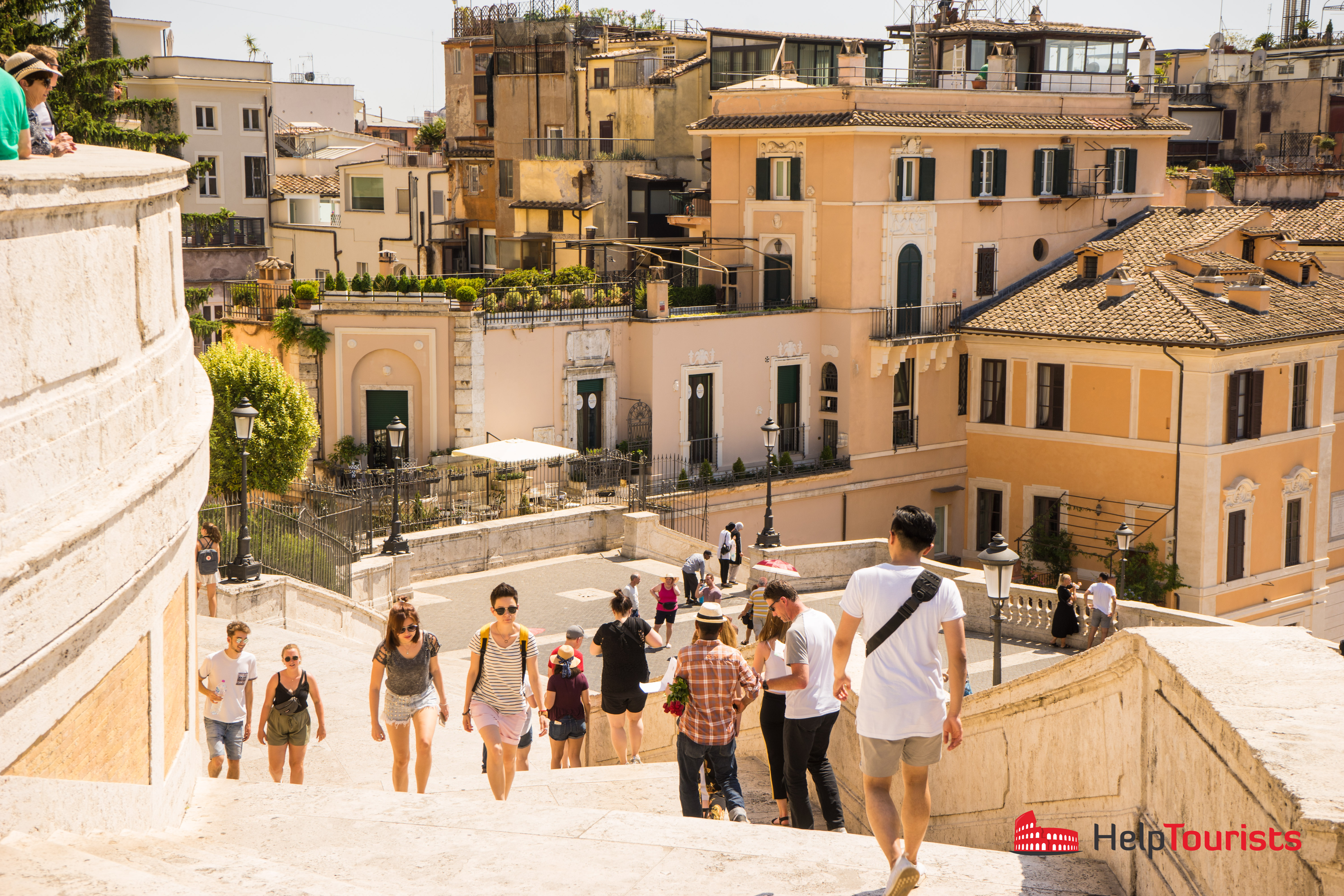
At the bottom of the stairs and opposite the space is the Via dei Condotti which leads further into the heart of Rome. The street is lined by designer boutiques and all big brands.
How to get to the Spanish Stairs in Rome
The Spanish Stairs are easily reached by metro line A at the station “Spagna”.
5. The Trevi Fountain in Rome
The Trevi Fountain is the most prominent fountain in Rome and on the top list of sights for most visitors. It was built at the spot where fresh water used to be transported via an aqueduct to Rome in ancient times.
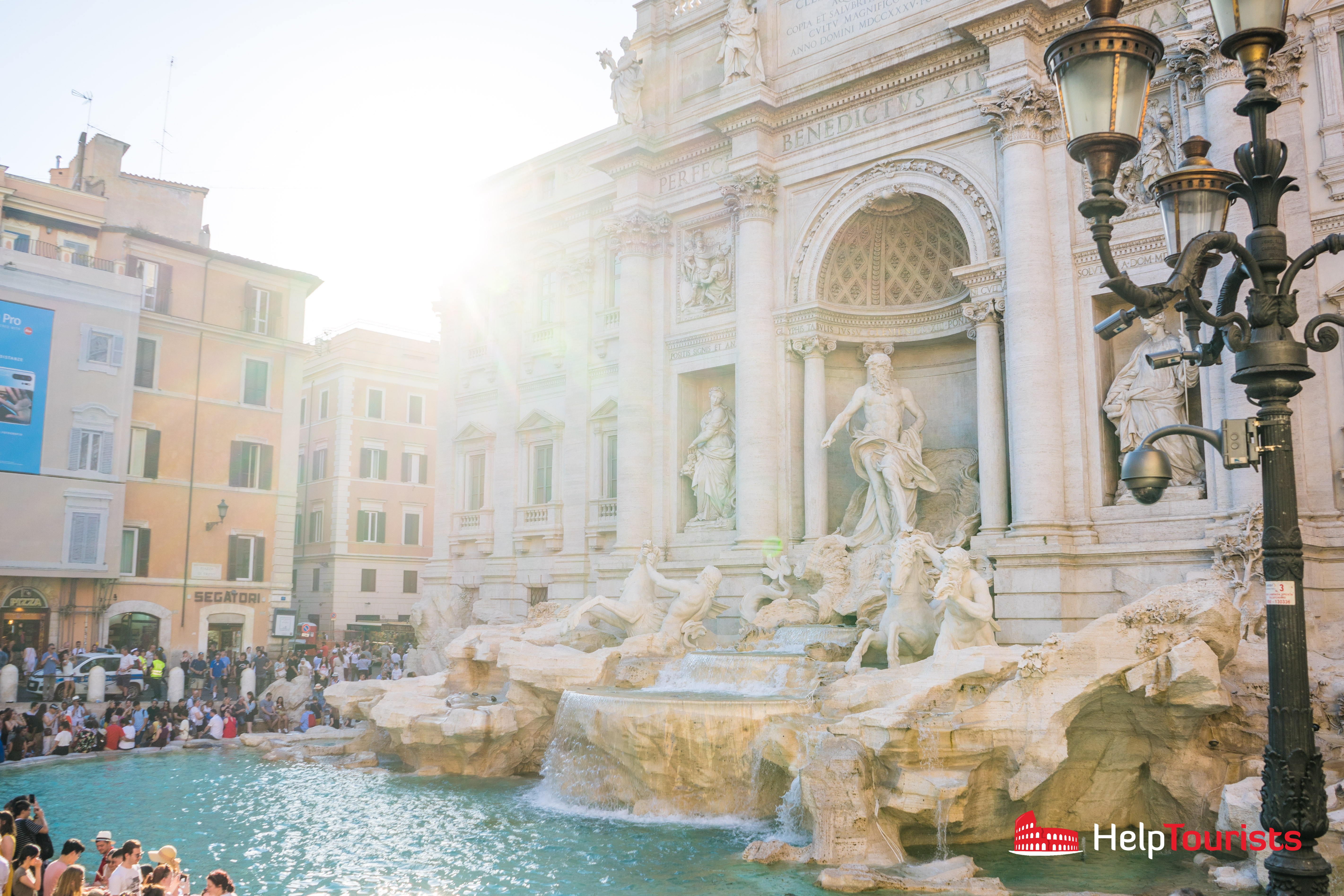
As for the setting the Romans decided to construct a house front in the style of an arch of triumph and with a statue of the sea god Neptune. Following a legend, it brings luck to throw a coin into the fountain. Two coins will have you fall in love with an Italian man or woman. Three coins will get you married with your sweetheart. Sounds good, doesn’t it?
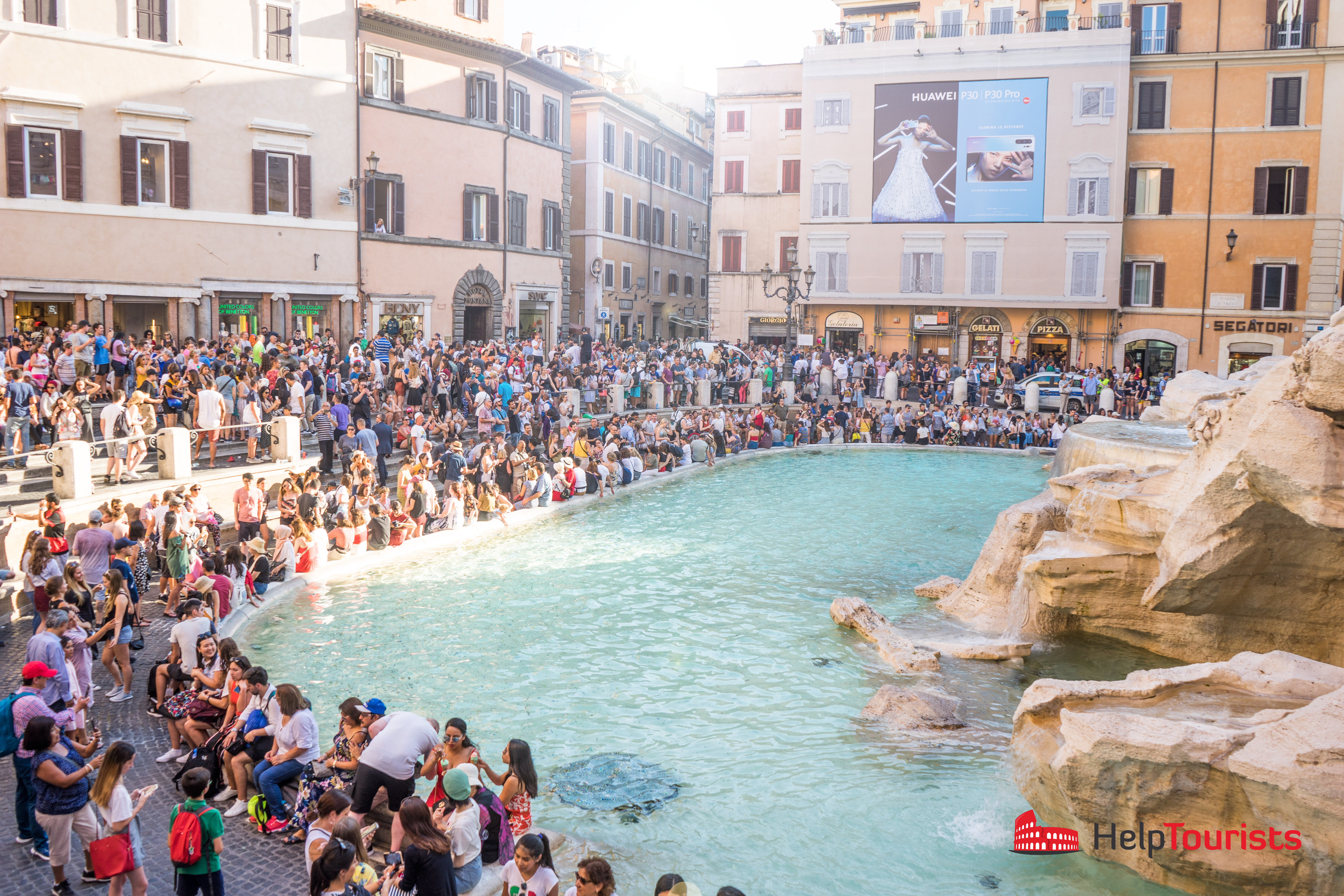
There are no statistics about the success rate, but to use a proverb: the proof of the pudding is in the eating! There’s just one thing to bear in mind: The coins have to be thrown over the right shoulder with your back facing the fountain in order to achieve the desired effect. Every week all the money in the Trevi Fountain is fished out and donated to the caritas. You may be surprised, but the coins can add up to a million euro per year!
How to get to the Trevi Fountain in Rome
The Trevi Fountain is easily accessible by metro line A at the station “Barberini”.
Fee for the Trevi Fountain in Rome
…a few coins!
Opening hours of the Trevi Fountain in Rome
It is always busy at the Trevi Fountain and its surroundings until late night.
6. Top 10 sights in Rome: St. Peter’s Basilica
St. Peter’s Basilica or San Pietro, as the Italians call it, is the burial church of the apostle Simon Peter, the center of the Vatican and thus, the focal point of the Catholic Church.
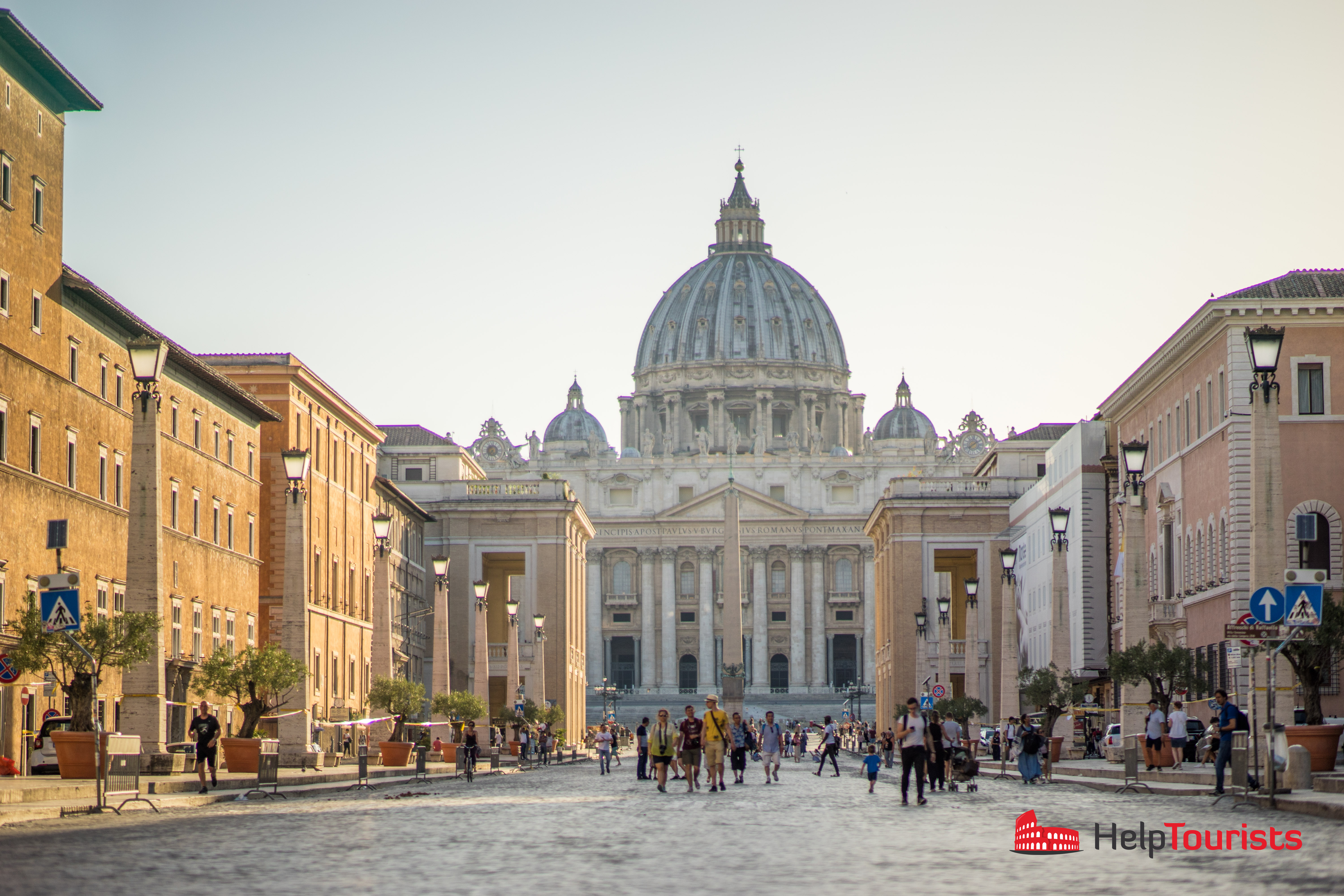
It provides enough space for 60,000 people to attend the audiences granted by the Pope. The bronze canopy designed by Bernini covers the high altar, and only the Pope is allowed to hold an audience under the baldachin.
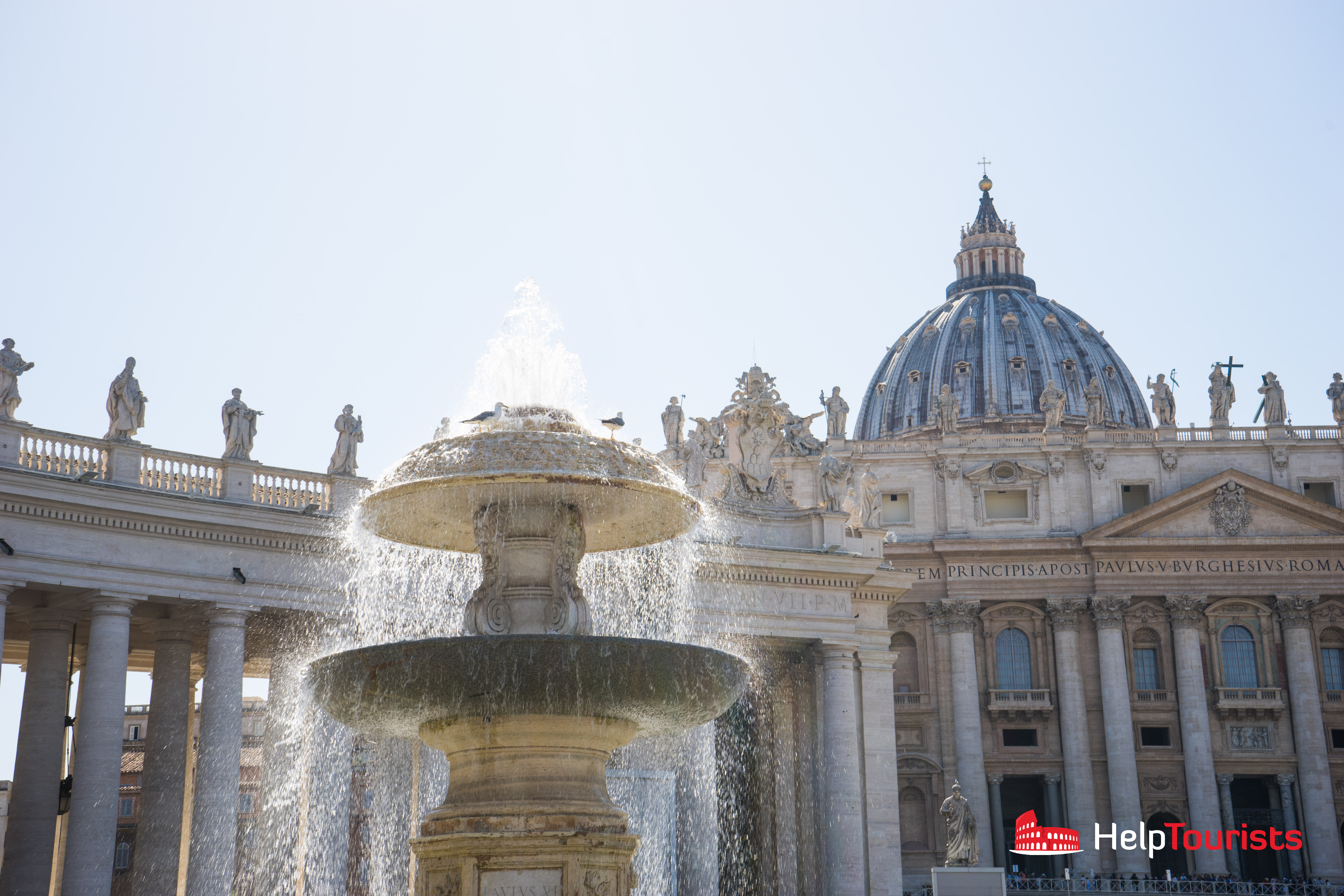
The dome of St. Peter’s Basilica is one of the largest free standing domes made of bricks and is open to visitors: 537 steps lead up to the top of the dome from which you have a great view of the Vatican and Rome.
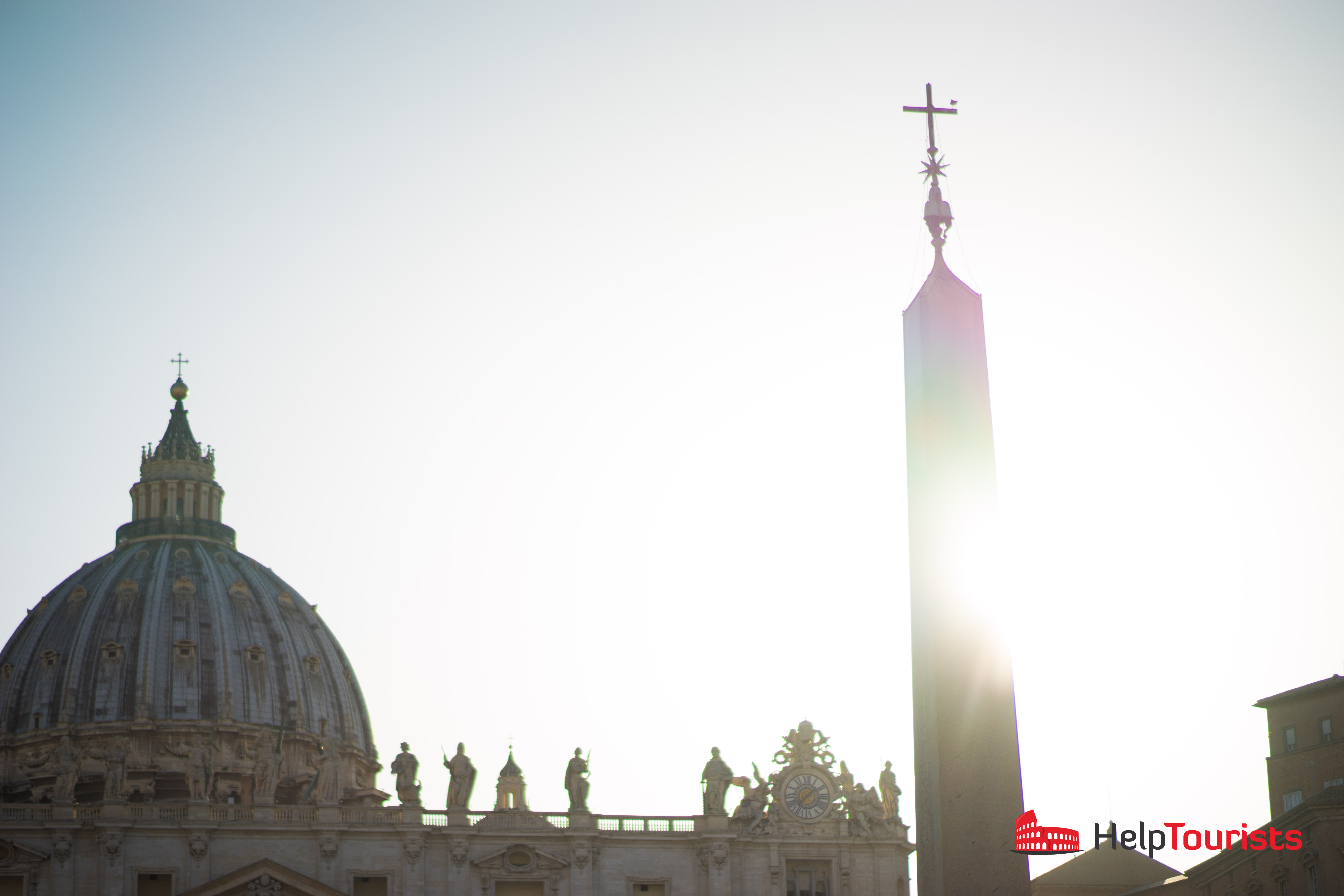
How to get to St. Peter’s Basilica in Rome
St. Peter’s Basilica in Rome is close to the metro station “Lepanto” or “Ottaviano” on line A and the tramway station “Piazza Risorgimento” on line 19.
Entry fees to St. Peter’s Basilica
Entry is free like in all other churches in Rome. If you want to climb up the dome, it’s 7 euro with the elevator and 5 euro by foot.
Opening hours of St. Peter’s Basilica in Rome
St. Peter’s Basilica in Rome is open from April to September from 7 am to 7 pm, and from October to March from 7 am to 6:30 pm. The dome itself is open from April to September from 8 am to 6 pm, and from October to March from 8 am to 5 pm.
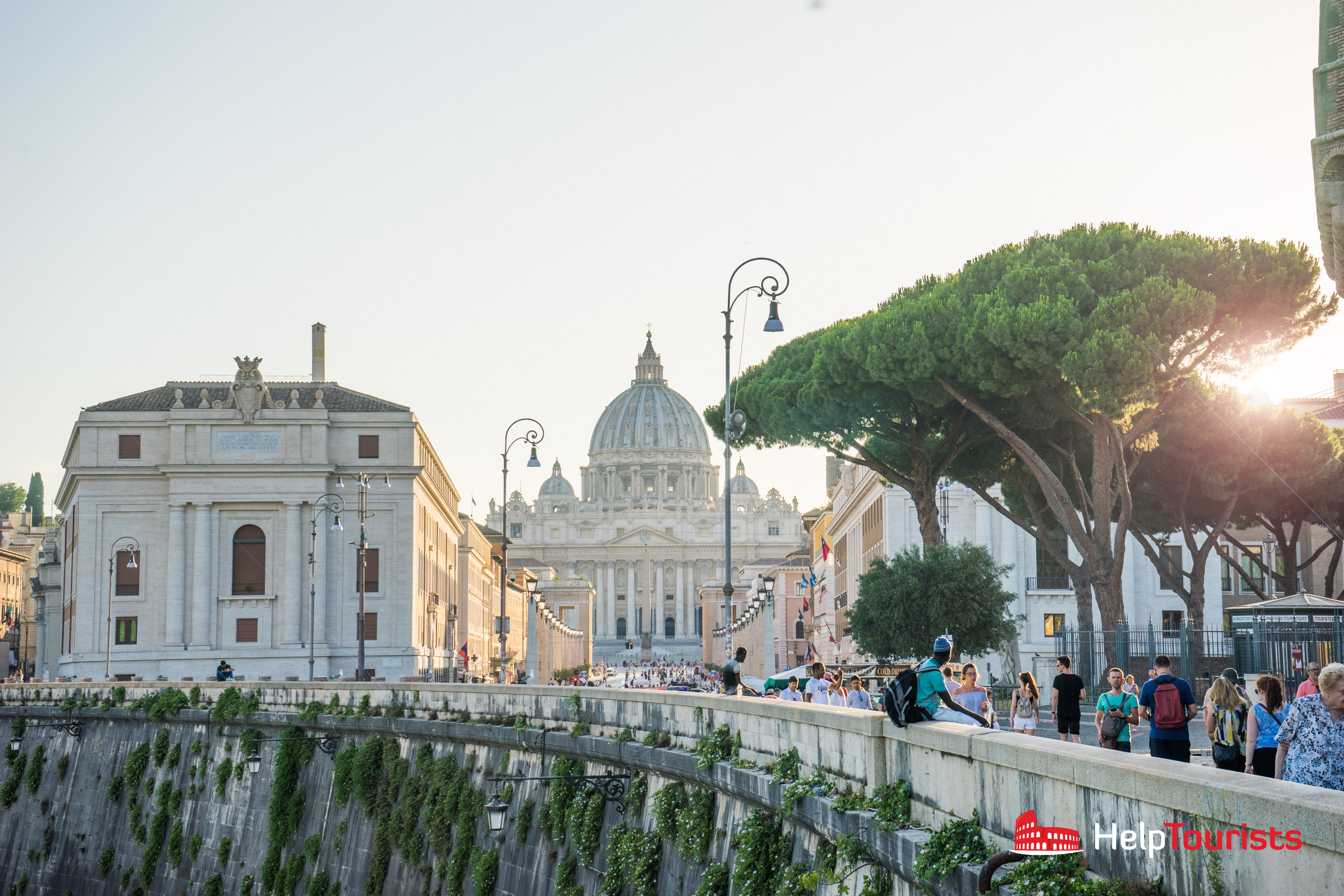
7. The Vatican Museums in Rome
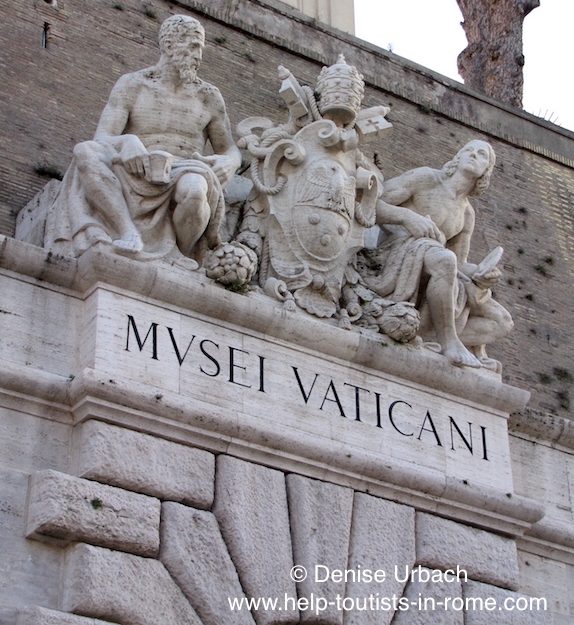 The Vatican Museums in Rome are one of the highlights in the Vatican. Over many centuries, the popes have collected a myriad of art treasures. But the architecture of the halls itself is very impressive. Among the things you can see are statues from the ancient period, five mummies in the Egyptian wing and most importantly, the Raphael Rooms with “the School of Athens” and of course the Sistine Chapel which was painted by Michelangelo in the 15th century. The Sistine Chapel contains the “Creation of Adam”.
The Vatican Museums in Rome are one of the highlights in the Vatican. Over many centuries, the popes have collected a myriad of art treasures. But the architecture of the halls itself is very impressive. Among the things you can see are statues from the ancient period, five mummies in the Egyptian wing and most importantly, the Raphael Rooms with “the School of Athens” and of course the Sistine Chapel which was painted by Michelangelo in the 15th century. The Sistine Chapel contains the “Creation of Adam”.
How to get to the Vatican Museums in Rome
You can reach the Vatican Museums in Rome by metro at the station “Ottaviano” (line A) and by tramway at the station “Piazza Risorgimento” (line 19).
Entry fees to the Vatican Museums in Rome
The entry fee to the Vatican Museums is 16 euro for adults and 8 euro for adolescents between 6 and 18. Children under 6 can visit for free.
At this point, it should be said that the waiting lines are very long and it’s not uncommon to wait for hours. To skip the lines, you should buy tickets in advance on the website of the Vatican Museums. There’s an extra charge of 4 euro, but it’s definitely worth it.
Opening hours of the Vatican Museums in Rome
The Vatican Museums in Rome are open from Monday to Saturday from 9 am to 6 pm. The counters already close at 4 pm.
7. Castel Sant’Angelo in Rome
The Castel Sant’Angelo in Rome was originally conceived as a mausoleum for the Roman emperor Hadrian and his successors.
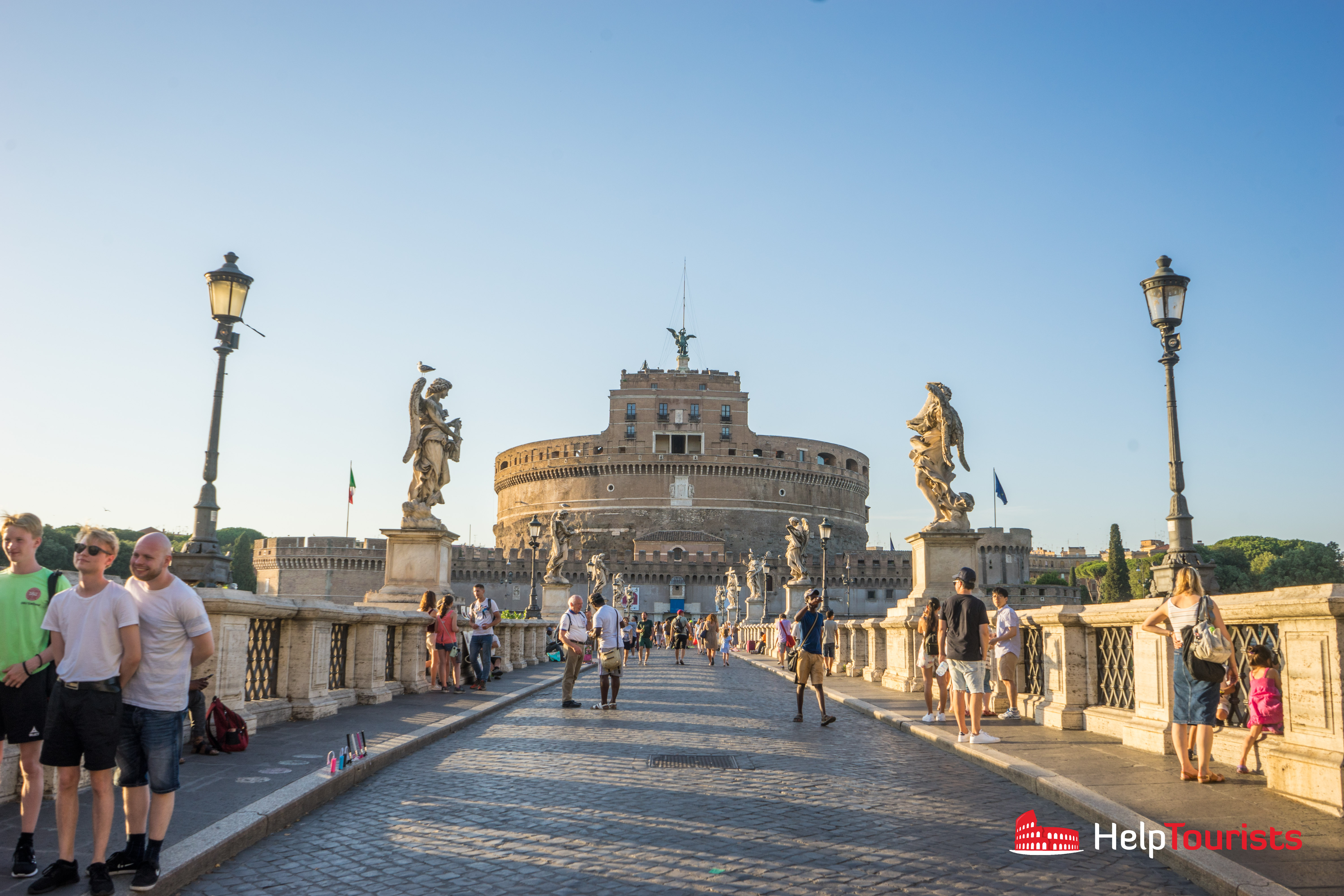
The construction began during his lifetime and terminated in 139 BC. However, in the course of its history, the Castel Sant’Angelo was used as a fortress and castle for almost 2000 years. The name originates from the year 590 when Rome suffered an epidemic plague.
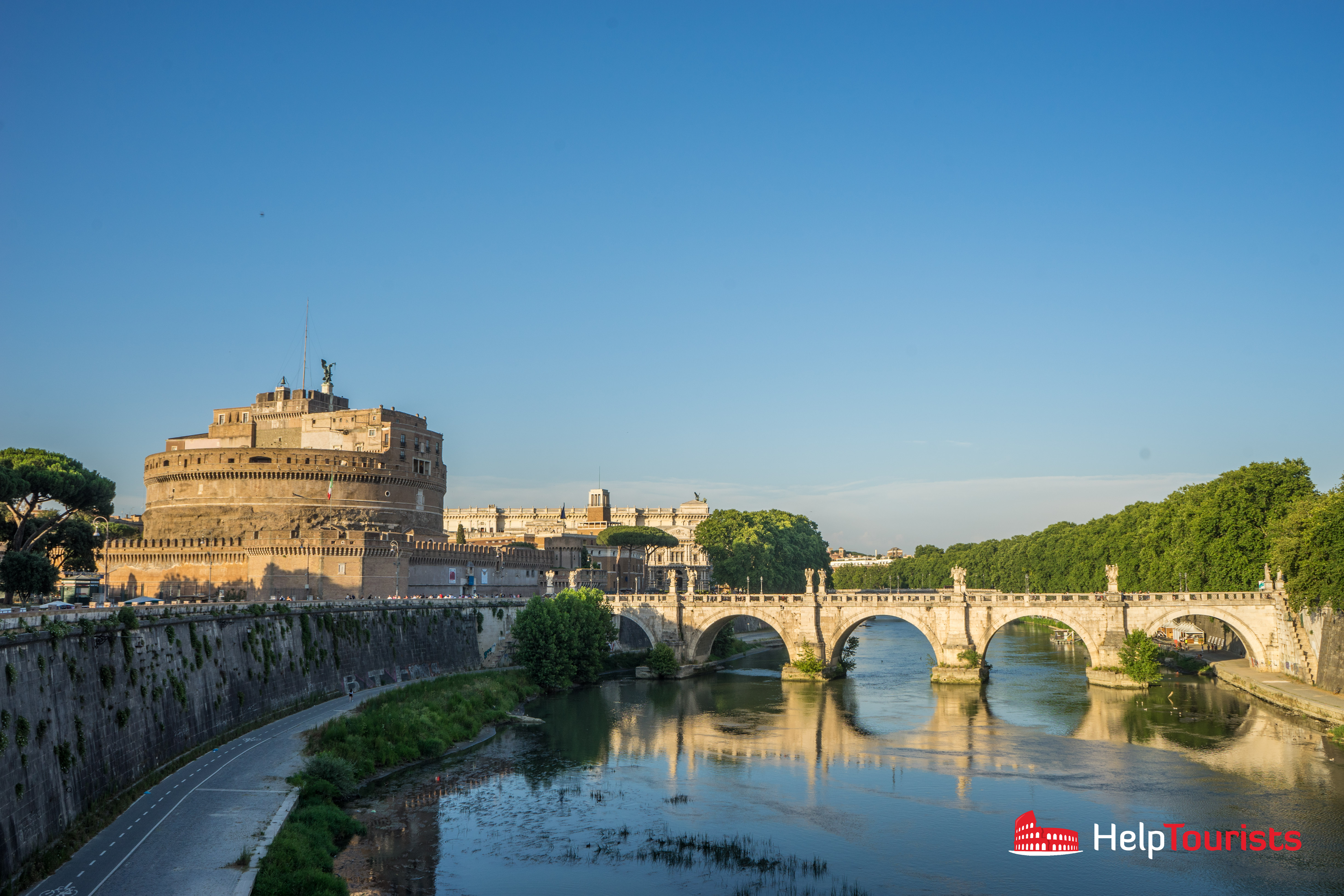
The Archangel Michael manifested himself to the Pope over the castle to announce the end of the plague. His statue is still enshrined on the top of the castle today. Nowadays the Castel Sant’Angelo is a museum and offers an impressive view from its windows and terraces over Rome and St. Peter’s Basilica.
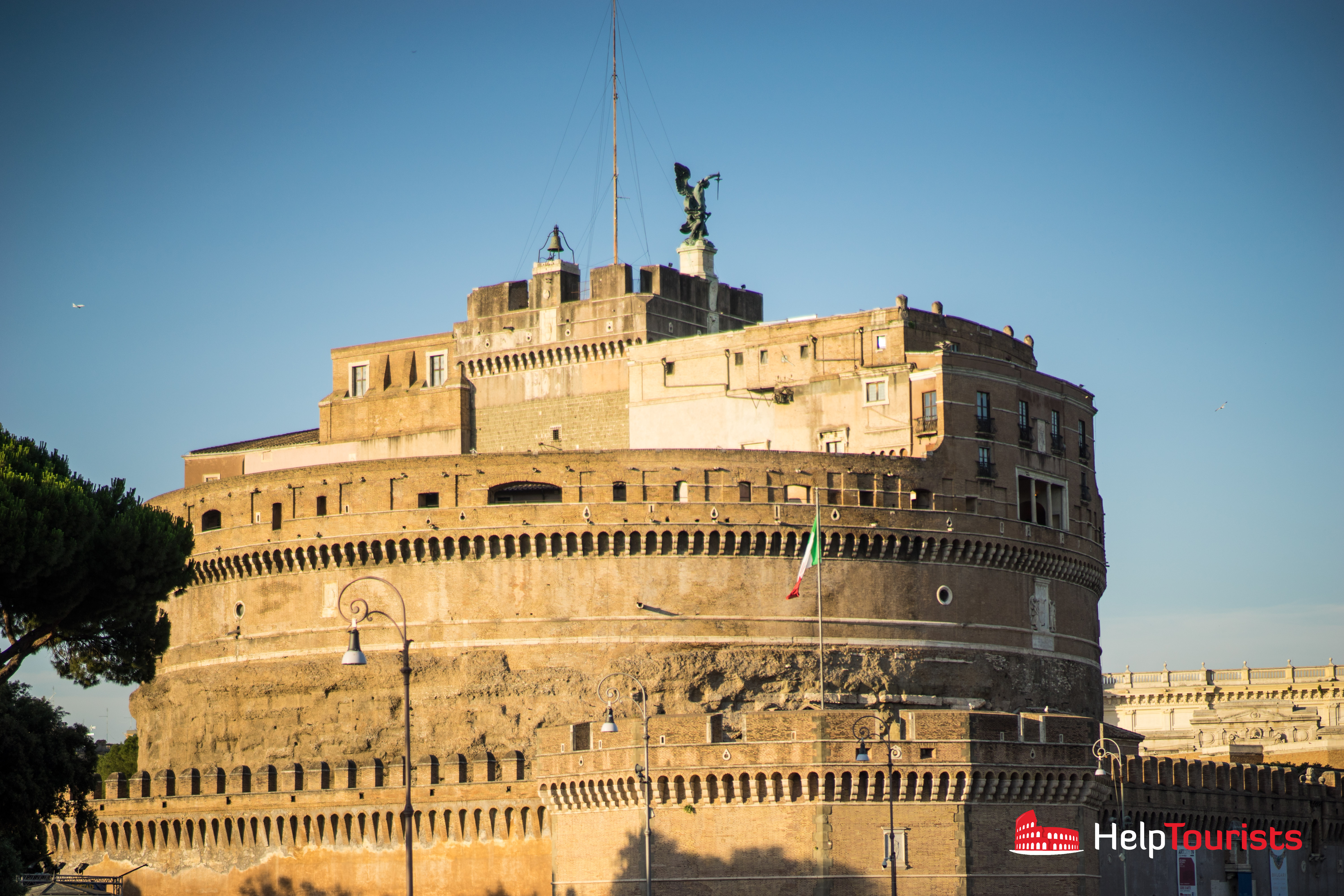
How to get to the Castel Sant’Angelo in Rome
The closest metro station is “Lepanto” on line A.
Entry fees to the Castel Sant’Angelo
The entry fee is 8,50 euro for adults and 6 euro for adolescents under 18.
Opening hours of the Castel Sant’Angelo in Rome
The Castel Sant’Angelo in Rome is open from Tuesday to Sunday from 9 am to 7:30 pm.
9. Borghese Gallery in Rome
The Borghese Gallery in Rome is a large park and landscape garden where you can find a number of monuments, temples and the Galleria Borghese.
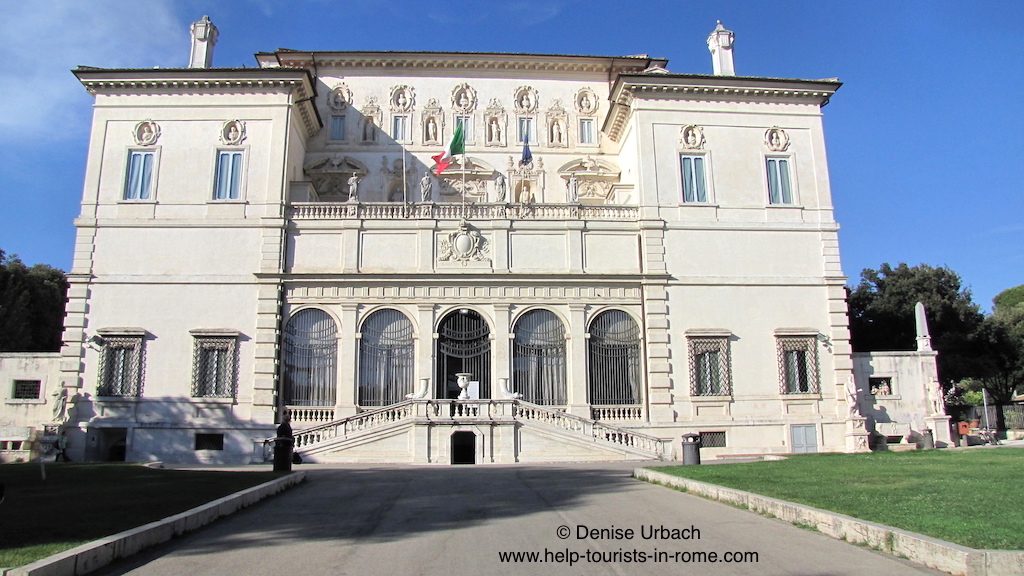
Originally, the park was the summer residence of the Borghese princely family. Today the Galleria Borghese is one of the most beautiful museums in Rome. The private art collection counts as one of the most splendid and valuable in the world. You can see paintings by Caravaggio, Leonardo da Vinci, Raphael, Rubens and Titian.
How to get to the Borghese Gallery in Rome
Take the metro line A to “Flaminio”.
Entry fees to the Borghese Gallery in Rome
In order to visit the Galleria Borghese in Rome, you must book a ticket in advance because there are no ticket sales on site! The reservation fee is 2 euro per ticket. Adults pay 9 euro for a ticket, adolescents between 18 and 26 pay 4,50 euro and children under 18 have free entry.
Opening hours of the Borghese Gallery in Rome
Galleria Borghese is open from Tuesday to Sunday from 9 am to 7 pm. The last entry is at 5 pm. The visit duration is limited to 2 hours per visitor. Accordingly, groups of visitors are admitted every 2 hours.
10. The Appian Way in Rome
Via Appia Antica or Appian way in Rome was the most important trading route in ancient Rome. The street led from the city to the seaport Brindisi where oriental products were brought into Italy and Rome.
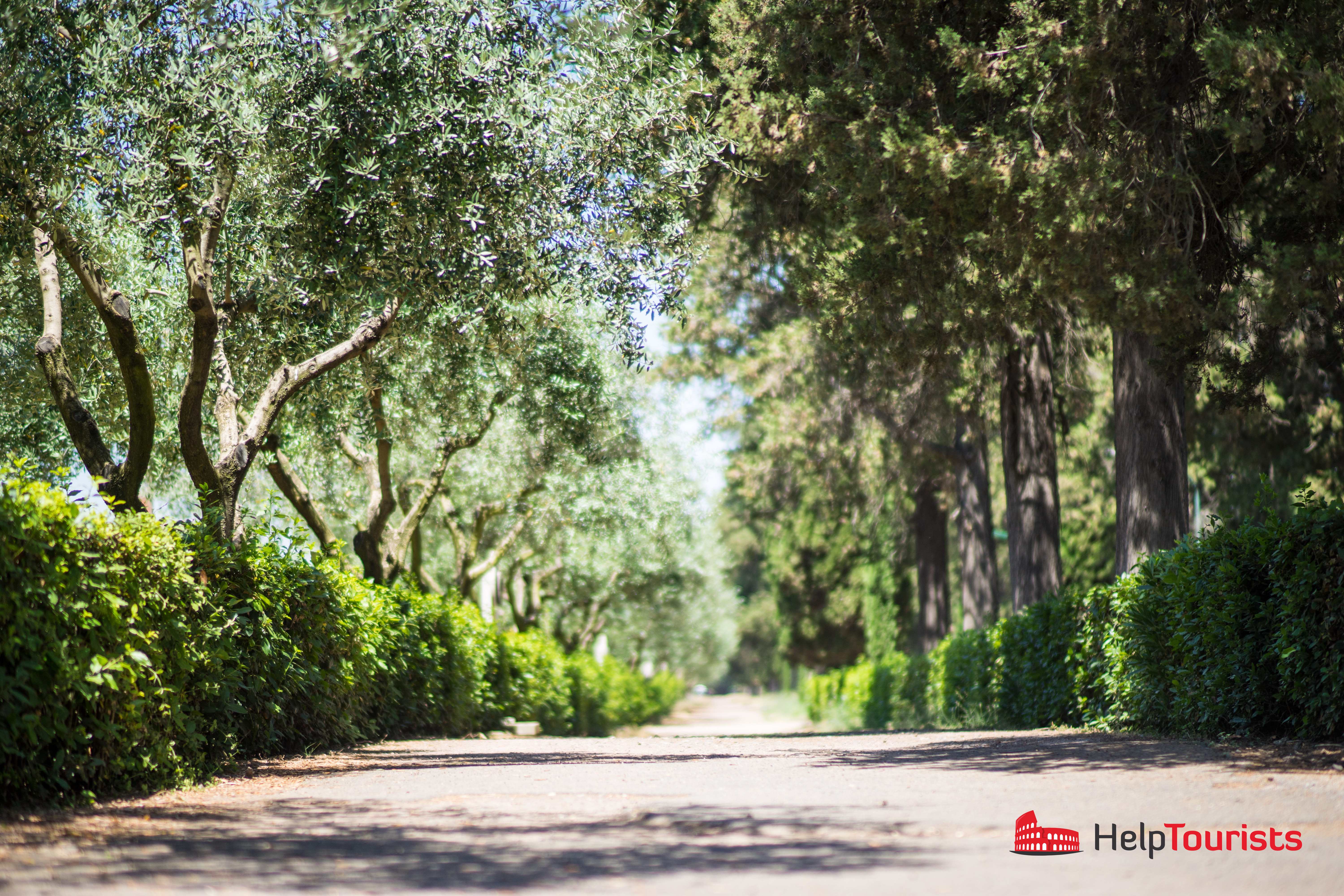
Via Appia reached this seaport in 191 BC and was at that time a modern street. It was continuously paved with big stones, had two lanes and sidewalks. Milestones were laid at regular intervals to indicate the travel time. In the Middle Ages the Via Appia Antica became a side street and was used as a stone pit at most.
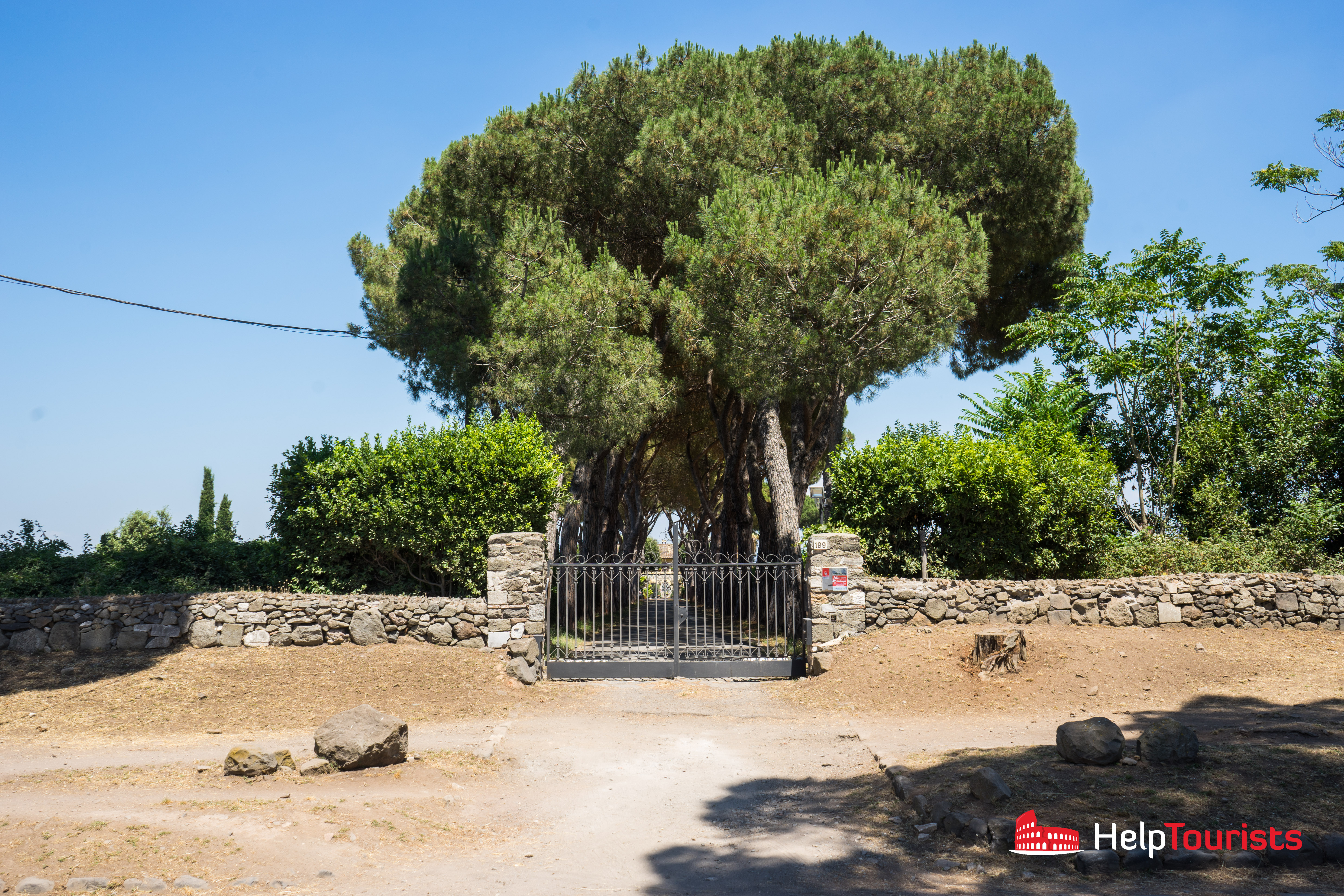
At present-day the 18 km long road has been transformed into the national park Via Appia Antica. You can still make out the original pavement here and then.
For many Italians and also tourists, this is a good place to retreat and rest from the city. Along the Via Appia Antica you can admire many antique buildings such as the Baths of Caracalla, the Aurelian Walls, and the Catacombs of San Sebastiano.
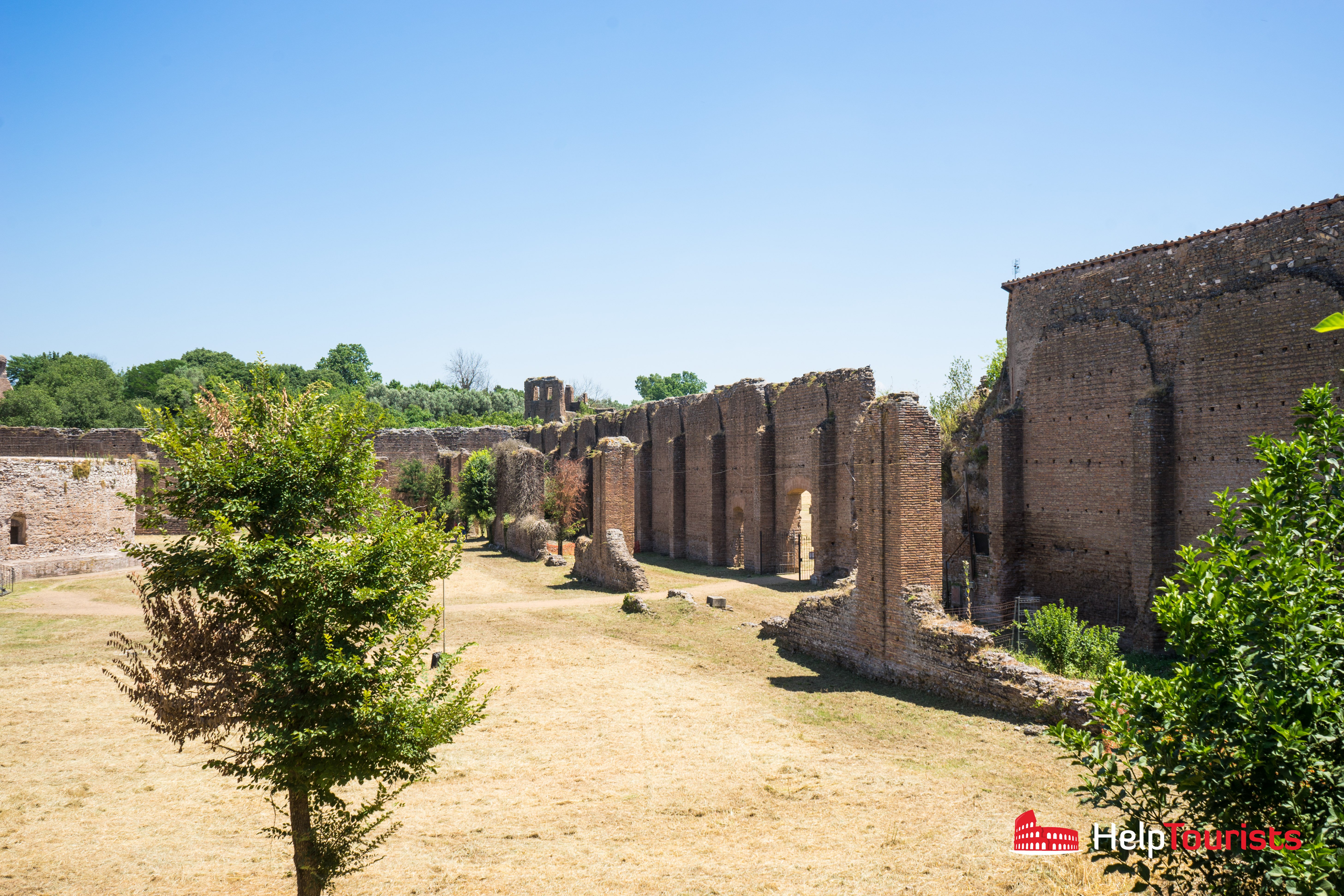
How to get to the Via Appia Antica (Appian Way) in Rome
To reach the Via Appia Antica in Rome, take the metro line A to “Colli Albani” and change to the bus 660 or metro line B to the station “Pyramide”. From there, take bus 118 to Via Appia Antica.
Social media
Become part of the HelpTourists community on Facebook! In our private group you can exchange ideas with other Rome lovers. Follow us on Instagram and Pinterest and get regular inspiration and insider tips for your next Rome trip!
Pin information about the top 10 sights in Rome on Pinterest
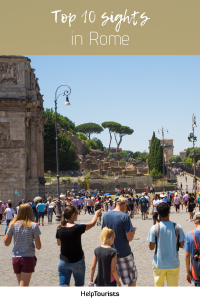
This article contains referral links. There are no additional costs for you, but thanks to these links we get a small commission. This enables us to continue to work diligently on the website and always have the latest information from Rome ready for you. Thank you for your support!







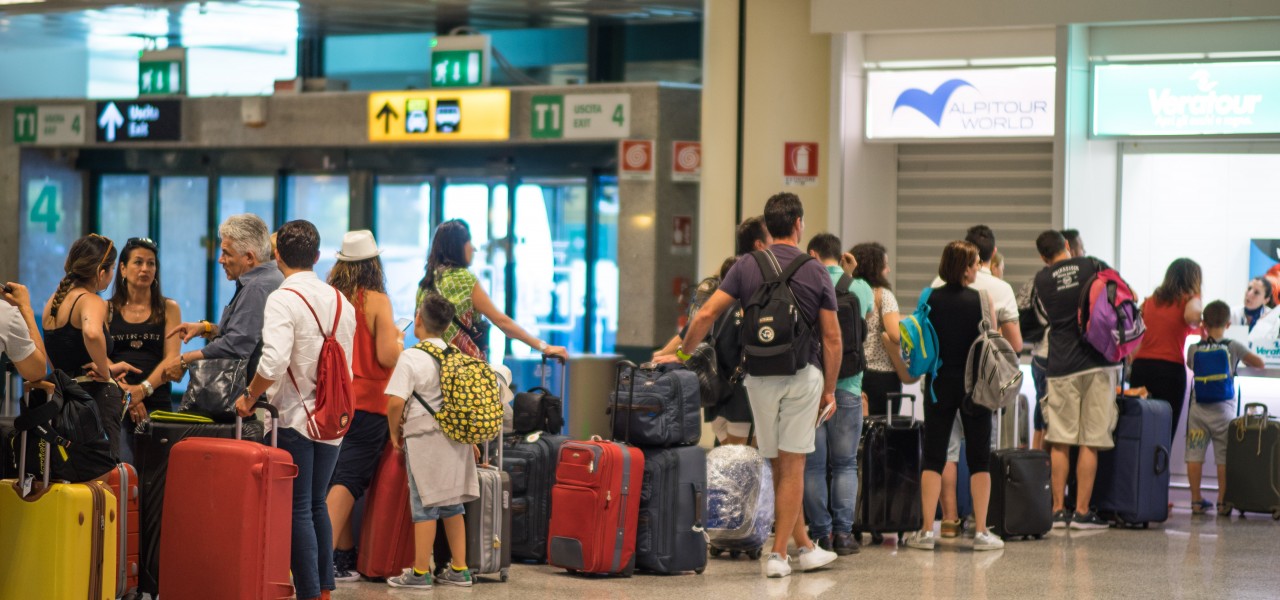
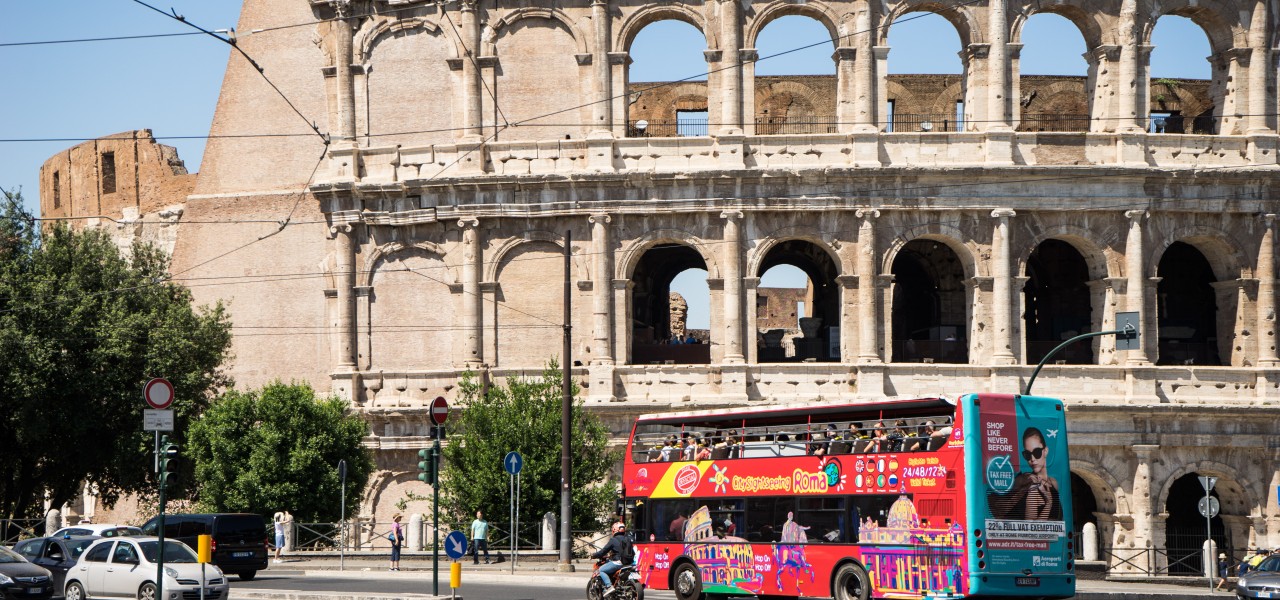
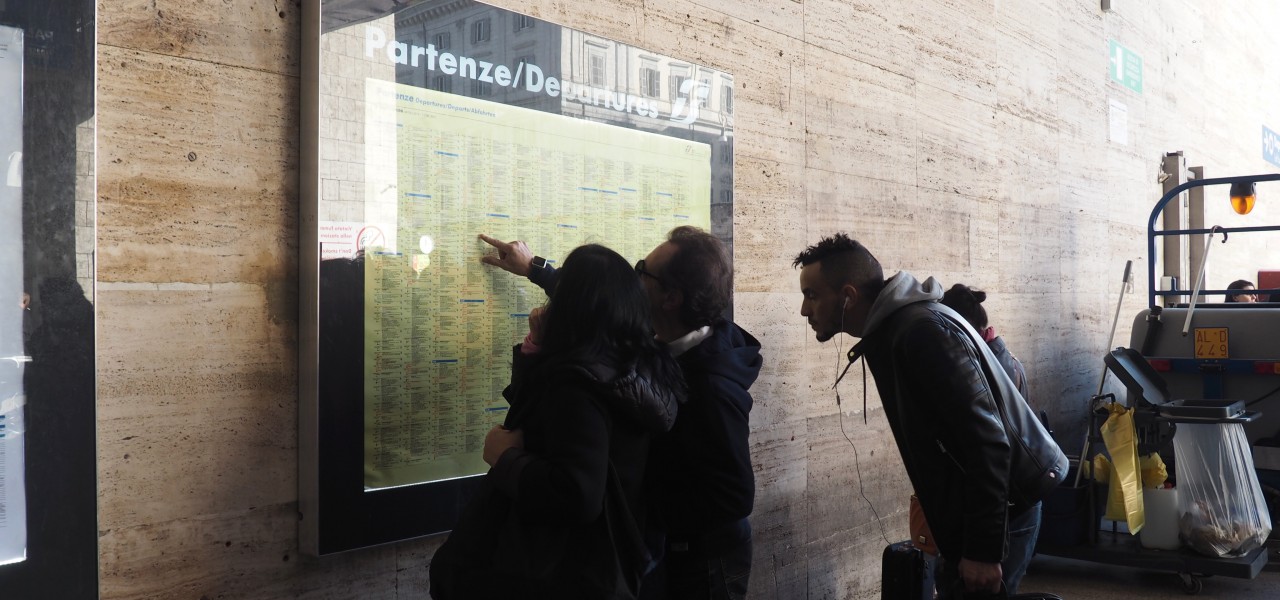
Thank you for your comprehensive information. I am a single, senior lady, 79 years young with a limited income. I have a disability which involves constant pain and limits my walking. I don’t require a wheelchair but definitely have restrictions as to how long or how far I can walk. Is there any discount for a person such as myself? I am bringing the “Disabled Parking Permit” I use in my car…..but would like to know if there is anything else to identify myself as disabled which might entitle me to your consideration. Thank you in advance.
Hi Jo-Ann,
in Europe it is quite common to have a disabled ID card. You should check, whether you can get one of these to benefit from reduced admission fees to many sights and museums in Rome. If not, you might want to get a medical certificate in English or even better in Italian.